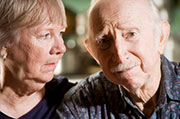- 10 Strategies to Overcome Insomnia
- Could Artificial Sweeteners Be Aging the Brain Faster?
- Techniques for Soothing Your Nervous System
- Does the Water in Your House Smell Funny? Here’s Why
- Can a Daily Dose of Apple Cider Vinegar Actually Aid Weight Loss?
- 6 Health Beverages That Can Actually Spike Your Blood Sugar
- Treatment Options for Social Anxiety Disorder
- Understanding the Connection Between Anxiety and Depression
- How Daily Prunes Can Influence Cholesterol and Inflammation
- When to Take B12 for Better Absorption and Energy
Less Sleep May Mean Less Sex After Menopause


Too little sleep may lead to too little intimacy for postmenopausal women, a new study finds.
The study included nearly 94,000 women who were asked about their sleep habits during the previous four weeks. They were also asked about their sexual activity during the past year, and their levels of sexual satisfaction. The women were all between the ages of 50 and 79, the researchers said.
Thirty percent of women had high insomnia levels, the study found. These women were less sexually active than those without sleep problems, the researchers said. The investigators also found that getting less than the recommended seven to eight hours of sleep a night was associated with less sexual activity and sexual satisfaction.
Although the current study found an association between a lack of sleep and sexual activity and satisfaction, it didn’t prove a cause-and-effect relationship.
The study is to be presented Wednesday at the annual meeting of the North American Menopause Society in Las Vegas. Findings presented at meetings are generally viewed as preliminary until they’ve been published in a peer-reviewed journal.
“We found that insomnia was associated with lower sexual function,” study author Dr. Juliana Kling, of the Mayo Clinic, said in a society news release. She added that the next step in her research will be to see how sleep and sexual function relate to each other over time.
Dr. Wulf Utian, executive director of the North American Menopause Society, said in the release, “What’s important for postmenopausal women to know is that they are not alone in this, and current treatments exist for those looking to improve their sleep habits and the intimacy in their relationships. They just need to talk to their doctor to find out what works for them.”
More information
The American Academy of Family Physicians has more about older adults and sexuality.
Source: HealthDay
Copyright © 2026 HealthDay. All rights reserved.










